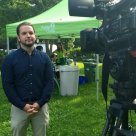A Montreal-area woman says the federal government is holding her heritage hostage.

Sixty-four-year-old Coteau-du-Lac resident Cheryl Hutley says her grandmother and her father were both Indigenous. For decades, however, the government has refused to recognize her aboriginal status even though she claims to meet all the requirements.
“Why is it so difficult to to get my rights? It’s just unbelievable,” Ricker told Global News.
These days, Hutley has reached the peak of her frustration.
“It wasn’t about the benefits of the financial benefits. It was more to honour his family, and to honour the Indigenous side of our family,” Hutley said, speaking of her father Dawson Morris.
She says what has stopped her from getting what’s still called official Indian status happened a century ago.
Because Hutley’s grandmother, Ruby Crawford, married a white man 30 years her senior back in the 1920s, she lost her status. According to Hutley, her grandmother was just a teen when she married the man, who had five children from a previous marriage.
“It wasn’t until 60 years later that the government said, ‘Hey, we’ve made a mistake,’ and they honoured her rights again to be an Indigenous woman and to be full status,” Hutley explained.
- What is a halal mortgage? How interest-free home financing works in Canada
- Capital gains changes are ‘really fair,’ Freeland says, as doctors cry foul
- Ontario doctors offer solutions to help address shortage of family physicians
- Budget 2024 failed to spark ‘political reboot’ for Liberals, polling suggests
Ruby’s son Dawson Morris, Cheryl’s father, was able to get his status as well.
“He worked on it and worked on it and finally got it,” said Mona Morris, Cheryl’s mother and the late Dawson’s wife.
“I think it was an easier process for him because it was his mother and his great grandfather,” Hutley said. “My father took it upon himself to say, OK, we need to honour our rights and attain full status again.”
The process has not been fruitful for her, however, as she says her requests to the federal government to be given status have twice been rejected now. She has been trying since 1999.
“If I’m born an Indigenous woman, just because my grandmother married a white man, how can they take that away from me?” she wonders.
Hutley’s younger sister Jan Ricker, who lives in British Columbia, has also unsuccessfully attempted to get her status.
“I attempted to get my status with the great help of my father because he was the one that was pushing for us to figure out our rights, who we are and our culture and everything else,” Ricker explained.
Like Hutley, Ricker has been rejected twice.
“It comes back to the grandmother. It always seems to be her that seems to be slowing down the process,” Ricker told Global News.
Recently, however, the government adjusted the rules. In 2020 Cheryl Hutley decided to apply again, this time with the help of lawyer David Schulze.
“A lot of people who are descended from a woman who lost her status because she married a non-Indian, those descendants are now entitled to status,” Schulze explained. Provisions of the federal government’s Bill S-3 that came into force in 2019 made Hutley eligible for status, according to Schulze.
A spokesperson for Indigenous Services Canada told Global News Bill S-3 is “an important step towards reconciliation and redressing historical wrongs.”
“Pretty much anybody in that situation born before April 1985 is now eligible. So it should be a fairly mechanical exercise,” Schulze said.
According to the lawyer, Hutley is just one of hundreds of thousands of people who became eligible to obtain status under the new regulations. He says Indigenous Services Canada did not hire enough people to deal with the influx of new requests.
After her latest request, Hutley was told she may wait two years for an answer. She doesn’t understand how after two applications, officials wouldn’t be able to address her file quicker.
“What is going on here? What is taking so long,” she wonders.
“Within a very dysfunctional government department, the Indian Registrar’s office is a particularly dysfunctional branch,” Schulze said.
Indigenous Services Canada tells Global News since 2017, they’ve received 30,728 applications related to the new rules, and have processed more than 16,471. They say productivity was affected by COVID-19, but has now returned to pre-COVID levels and will soon increase.
“We are also taking additional steps to ensure timely processing of applications. These include updated administrative processes, investments in operations, and increased staffing including two units dedicated to processing S-3 applications,” said Indigenous Services Canada spokesperson Genevieve Guilbert.
The government would not speak about Hutley’s specific case, but invited her to reach out to them for more information. Hutley says she’s been in constant contact with Indigenous Services, but getting answers is always difficult.
“Like many Government of Canada services, staffing of our in-person service centres and Public Enquiries Line call centre have also been affected by COVID-19 related public health restrictions. While we try to respond to all enquiries in a timely manner, we do recognize that some clients are experiencing delays, especially with our call centre,” explained William Olscamp, another Indigenous Services spokesperson.
Hutley plans to keep calling Indigenous Services regularly to follow up. She hopes the fact that she’s hired a lawyer will help expedite the process.



Comments